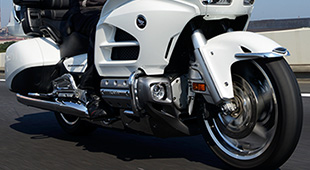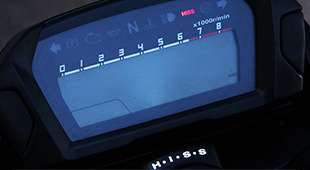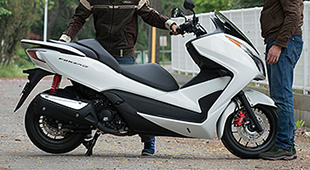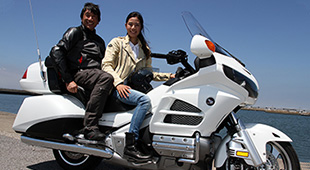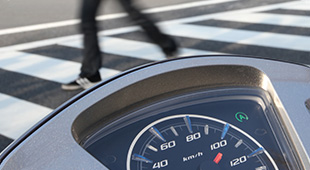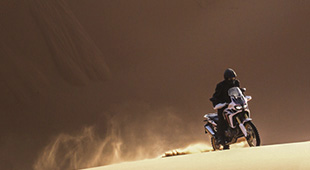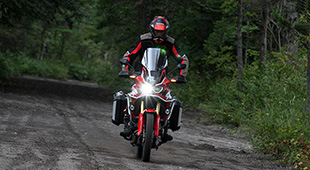Tech Views — Vol.1 Dual Clutch Transmission
CRF1000L Africa Twin (Dual Clutch Transmission) : 2/2
As the road narrowed and became more rocky, I really began to feel the strain of handling such a big bike. Unless I kept the throttle open to some extent, I felt that I’d lose too much speed, making the going unsteady, and I surely didn’t want to be unsteady on this road surface. I selected an appropriate gear and concentrated on my throttle control in the corners so as not to break my momentum. On top of that, I also constantly needed to operate the clutch, making the going even busier.
I tried to choose a line that kept the front tire from being deflected by big stones, and built up quite a sweat in the hard going. This was because I had to control the bike in a somewhat tense state of comfort while trying to maintain my balance by moving my body around.
Undaunted by these adverse conditions, the Africa Twin powered its way through the difficult stretches. The anxiety I usually experience when riding over such terrain turned to relief, and a feeling of pleasure and satisfaction soon overtook me.
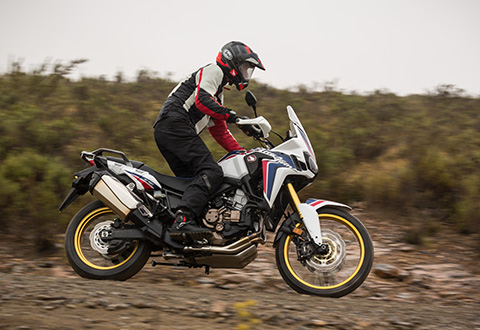
After a rest, I retraced the same route on the DCT-equipped Africa Twin. While I enjoyed riding the MT version I had just been on, as on the road course the day before, it ran without a hint of trouble. On the other hand, based on my earlier travels on the DCT-equipped VFR1200 or NC series models, I felt that the MT version would probably be better than the DCT-equipped Africa Twin when it came to riding ease on dirt roads. With this in mind, I started my ride.
To test out the DCT's operation, I tried climbing up a wet and slippery slope. I opened the throttle, and smoothly powered up the steep grade without losing any driving force as a result of unwelcome rear wheel slippage. This feeling of secure grip over such a slippery road surface caused any initial anxiety I might have had to completely disappear, and I felt a real sense of accomplishment when I got to the top of that 10-meter high slope.
Over my thirty years of accumulated riding experience, through trial and error I've been tossed about by many rough roads around the world. Even expert riders like me run into occasional difficulties maintaining precise control and keeping clutch and throttle operations in perfect sync, as Honda's DCT models do automatically. For example, rear wheel slippage caused by letting out the clutch too quickly or losing out to gravity on a steep grade can cause the engine to stall, possibly stranding the bike. As a result, the bike could topple over on its side, possibly breaking the clutch or brake lever in the fall and making it impossible to ride.
If the engine stalls on a slope, it becomes very difficult to support the bike by touching down one's feet, especially since the rear brake needs to be applied when stopped on an uphill grade. It follows then that the bike must be supported on one foot alone. Then, how do you get the bike back down to the bottom of the slope in that situation? My heart almost exploded with anxiety.
Small mistakes in off-road riding can quickly lead to accidents resulting in serious damage. Based on long years of experience, I try my best not to repeat the same mistakes once I've successfully extricated myself from a difficult situation. The old saying that 'a wise man steers clear of danger' has become ingrained in my psyche. And this is particularly true when on a big bike like the Africa Twin. That said, I went so far as to make three attempts on the DCT-version Africa Twin in short order.
Riders with extensive off-road riding experience might be surprised at the performance possibilities that DCT offers when situations that they thought were difficult suddenly become a lot easier. Even seemingly treacherous obstacles seem to shrink down to pleasantly manageable challenges.
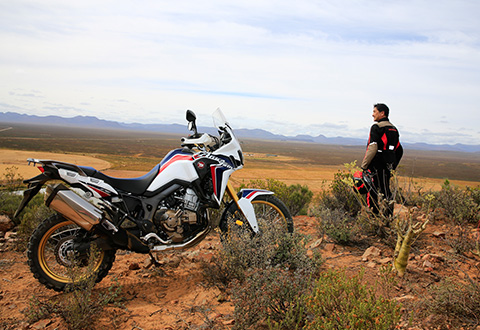
Following this, I took another spin on the dirt course. As the road had gradually dried, I noticed I was kicking up quite a cloud of dust on the rough uphill trail. By this time its tight turns were chopped up by deep rifts. When I rode this course on the MT model, I got all tense and nervous, making it quite an ordeal to get through. On the rough uphill section, the bike became hard to control if my speed was too fast, or I'd lose my balance if I took it too slow. This section required correctly remembering where to increase or decrease speed, and where to turn the bike while contorting my body just to overcome those deep rifts.
In contrast, the DCT model totally liberated me from clutch operation, so I could do what I needed to do without applying unnecessary force to the handlebars. Since my upper body was relieved of a lot of that earlier stress, I found I could concentrate more on choosing my lines with greater freedom, which is one of the basics of good cornering.
The rough uphill section was just wide enough for one small passenger car at most, and I went up the left side of the rutted road. When I took this path on the MT model, there were times in the corners when I got distracted by clutch operation and strayed off my chosen line. On the DCT model, I could better focus my attention on reading the road ahead, and was able to more securely direct my eyes forward. As a result, I was able to follow my line more clearly, which is also one of the basics of motorcycle operation. Being relieved of troublesome clutch operation made it much easier to keep my composure.
Later, I rode a trail that extended deep into the vast desert, thinking that being able to travel blissfully through a place like this was another sign of the Africa Twin's considerable potential. When Honda's rivals hear that off-road riding can be enjoyed in such a relaxed manner and at such a fast pace thanks to the DCT, they'll be more than little bit shocked.
Dirt roads are often slippery, and any sudden maneuvers like panic stops or sudden starts must be strictly avoided, making the smoothest possible operation of throttle and brakes even more important. The DCT-equipped Africa Twin's ability to allow a rider to concentrate on these operations is rare among motorcycles.
Further, since DCT takes over control of the clutch from the rider, it prevents human error caused by slipping the clutch, as can often occur when feeling rushed. It also holds up well in long touring, and probably makes maintenance costs low as well. Besides all that, simply being able to sit back and enjoy the ride definitely had the greatest appeal. This really was fantastic...
I finally understood just what that engineer meant when he told me: "You'll understand completely when you actually ride it." It seemed to me that the new Africa Twin might be a sort of message addressed to a wide cross-section of riders, telling them that 'there's now even more to enjoy in off-road riding.'
Many Africa Twin riders may not have much experience actually riding off-road. However, this machine really gives a boost to one's spirit of adventure, and makes anyone feel that they can venture off onto any dirt road that catches their eye. Now they can actually travel those roads with comfort and confidence.
When you're able to take the Africa Twin out on a test ride of your own, I recommend that you imagine riding in some place where it's difficult to touch the ground or that requires a perfect sense of balance when negotiating U turns or maneuvering at slow speeds. In those moments, you'll experience the same sense of ease that I've tried to describe here, and will likely exclaim, "That's what he was talking about!"
The manual shift Africa Twin was fantastic. However, I also discovered that its DCT version was even more amazing. In the racing world, assumptions based on the word "If" are never allowed. Still, "if" the DCT-equipped Africa Twin had existed some twenty-odd years ago, I'm sure I could have tackled the sand dune sections of the Paris-Dakar Rally with greater composure, and I wouldn't have had my confidence nearly crushed by pointless anxiety.
However, that was then and this is now. From this day forward, the new Africa Twin stands as one of the best choices to be found in motorcycling. How wonderful is that?! The very thought of it excites me even now, long after my test ride was finished.

